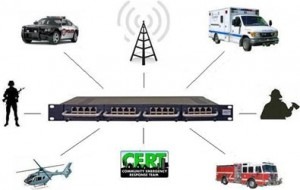
Ensuring Voice and Data Security in Radio Communications
In today’s fast-paced world, secure communication systems are critical in both military and civilian applications. Whether it’s emergency response teams, law enforcement agencies, or private organizations, maintaining secure voice and data transmission ensures the integrity and confidentiality of your communications. This is where COMSEC, or Communications Security, comes into play. COMSEC, as defined by the National Security Agency (NSA), encompasses measures and controls taken to deny unauthorized individuals access to telecommunications and ensure the authenticity of such communications. While COMSEC is traditionally associated with military applications, its principles are increasingly relevant to commercial, municipal, and industrial radio networks as well.
The Continuing Importance of Radio Communications
Despite the ubiquity of cellular phones, radio communications remain indispensable in various industries. Here are three key reasons why:
- Reliability in Emergencies – Unlike cellular networks, which can become overloaded or fail during natural disasters, radio communications provide a reliable means of communication during crises. First responders, disaster recovery teams, and public safety organizations depend on dedicated radio channels to coordinate efforts efficiently.
- Instant and Group Communication – Two-way radios allow for real-time communication between teams without the delays of dialing, call connections, or signal drops. Radio over IP for devices enhances this capability by extending radio networks over the internet, enabling seamless long-range communication.
- Independence from Commercial Networks – Organizations that operate private radio networks don’t rely on commercial cellular infrastructure, reducing the risk of network outages or interference. This is especially valuable for industries such as logistics, utilities, and security services.
Two Popular Radio Encryption Methods
Ensuring secure communication systems means implementing robust encryption methods. Two commonly used encryption techniques in radio communications are:
- AES (Advanced Encryption Standard) Encryption – Widely regarded as one of the most secure encryption methods, AES is used in both military and commercial radio applications. It offers 128-bit or 256-bit encryption, making it extremely difficult for unauthorized parties to decrypt transmissions.
- P25 Encryption – Designed specifically for public safety and emergency response teams, Project 25 (P25) encryption ensures interoperability between different agencies while maintaining a high level of security. P25 radios use encryption keys to protect transmissions from interception.
The Benefits of Radio over IP
One of the most significant advancements in radio communications is the integration of Radio over IP (RoIP). The benefits of Radio over IP include enhanced scalability, cost-effectiveness, and interoperability. By transmitting voice communications over the internet, RoIP connects radio networks across different locations, making it easier for organizations to coordinate across vast geographic areas. This technology is particularly valuable for utility companies, law enforcement agencies, and transportation services that require seamless communication across multiple sites.
The Role of a Radio Communications Partner
When establishing a secure radio network, working with an experienced radio communications partner is essential. From selecting the right encryption protocols to ensuring proper device configuration, a trusted partner can provide the expertise needed to protect your sensitive communications. Additionally, a skilled partner can help with network integration, compliance requirements, and ongoing system maintenance.
The Importance of a Communications Engineer
Implementing a secure and efficient radio network requires technical expertise. A radio communications engineer can assist with:
- Device programming – Ensuring radios are properly configured with the necessary encryption and frequency settings.
- Security protocols – Implementing authentication measures to prevent unauthorized access.
- Network optimization – Designing a system that minimizes interference and maximizes coverage.
Having an expert handle these aspects ensures a seamless and secure communication network for your organization.
In an era where secure communication systems are more critical than ever, organizations must prioritize voice and data security in radio communications. Whether through AES encryption, P25 technology, or leveraging the benefits of Radio over IP, protecting sensitive transmissions is crucial. By working with a reliable communications provider, businesses and municipalities can ensure their radio networks are equipped with the latest security features, properly programmed hardware, and ongoing support. Without the right expertise, organizations may find themselves vulnerable to security breaches, operational inefficiencies, and compliance risks. Partnering with a trusted provider is the key to establishing a reliable and secure radio communication system.
Post a comment